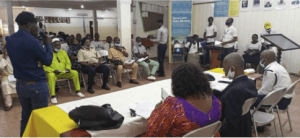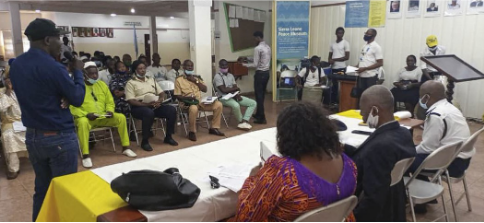 On 23 March 1991, thirty years ago today, fighters from Sierra Leone’s Revolutionary United Front (RUF) crossed into Sierra Leone from Liberia and launched an armed conflict that lasted more than a decade. When the war ended in 2002, the war had cost tens of thousands of lives and left countless others mutilated and displaced.
On 23 March 1991, thirty years ago today, fighters from Sierra Leone’s Revolutionary United Front (RUF) crossed into Sierra Leone from Liberia and launched an armed conflict that lasted more than a decade. When the war ended in 2002, the war had cost tens of thousands of lives and left countless others mutilated and displaced.
The Special Court for Sierra Leone was established in 2002 by an agreement between the United Nations and the Government of Sierra Leone with a mandate to try those bearing the greatest responsibility for committing, and for aiding and abetting, crimes committed against civilians during the conflict. The Special Court tried and convicted leaders of the three warring factions, handed down sentences of from 15 to 52 years, and established judicial precedents that have been adopted by other international tribunals.
Human Rights Commissioner Simitie Lavaly recalled that the first shots fired at Bomaru three decades ago had degenerated into an eleven-year war in which thousands were killed, mutilated, displaced, made sex slaves and child soldiers, with major infrastructural damage to criminal justice institutions. She noted that the country’s Truth and Reconciliation Commission had found that potential causes of conflict remained unaddressed. She called for a moment of silence “in solidarity with those who were maimed, injured, raped, displaced, tortured and suffered other unmentioned sufferings.”
“May your suffering not be in vain but lead us as a nation to look for lasting peace.”
Sierra Leone’s first prosecutor, David M. Crane, recalled the aftermath of the conflict which, he said, had brought nothing but pain and suffering to millions. “Sierra Leone is now on a path for a better future,” he said. “I was proud to have led an amazing team that helped put Sierra Leone in that path.”
The Court’s innovative Outreach Programme, engaging with civil society organizations through the Special Court Interactive Forum (SCIF), student groups, traditional leaders, and many others, worked to promote the rule of law in Sierra Leone, and to contribute to the fight against impunity.
In observation of this anniversary, the RSCSL in Freetown sponsored an event at the Sierra Leone Peace Museum which brought together civil society organizations, former victims and fighters, members of the Sierra Leone Police, the Military, and the Prisons Service. Students from seven schools in Freetown and Waterloo, along with youth groups from Waterloo, Allen Town and Freetown, were invited to attend. They heard speakers from the Human Rights Commission, the National Commission for Democracy, and the Sierra Leone Police.
The Residual Special Court, the successor to the Special Court, works to preserve the Special Court’s legacy, and to ensure that what happened in Sierra Leone will never be repeated in the country.













